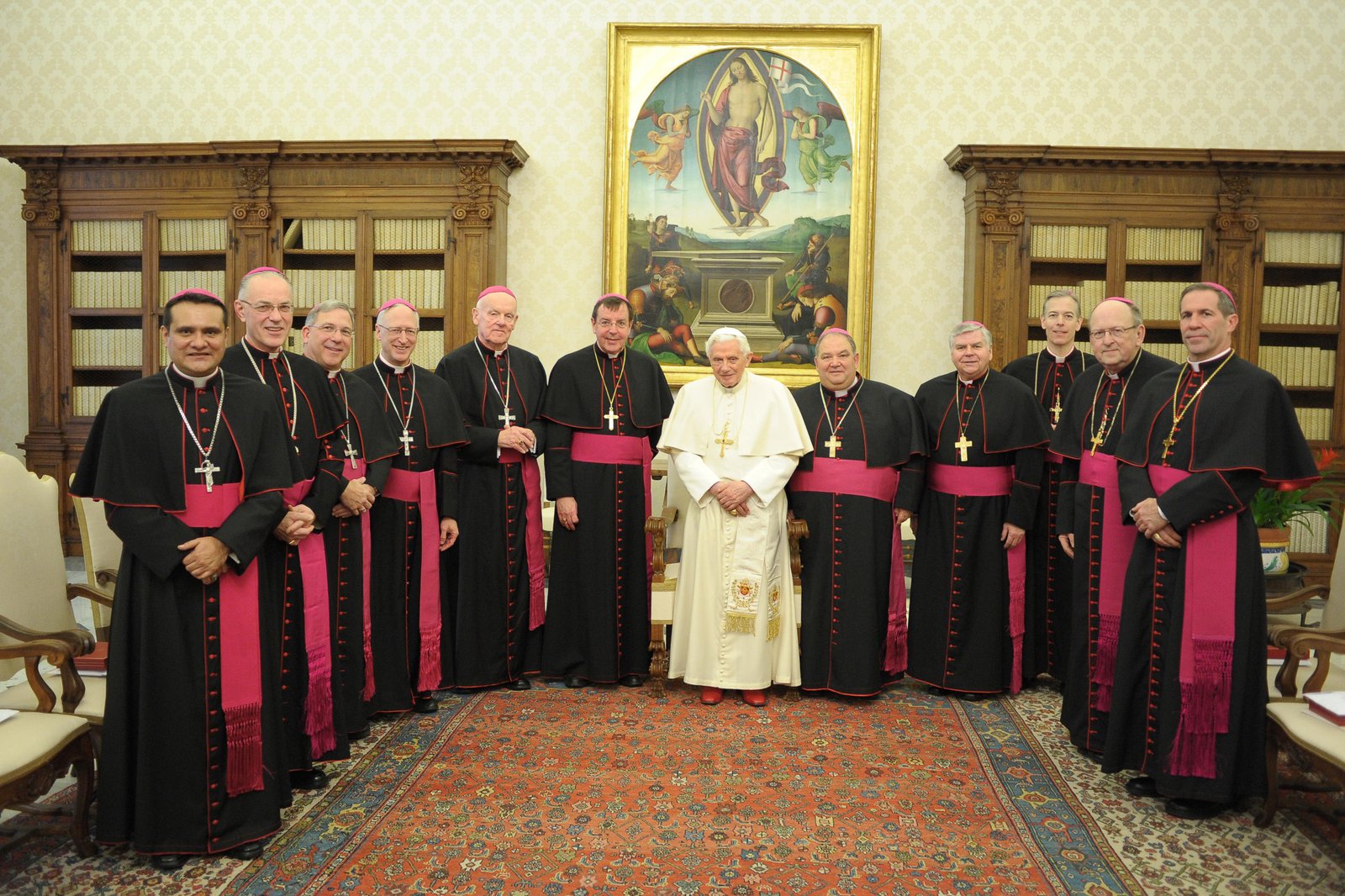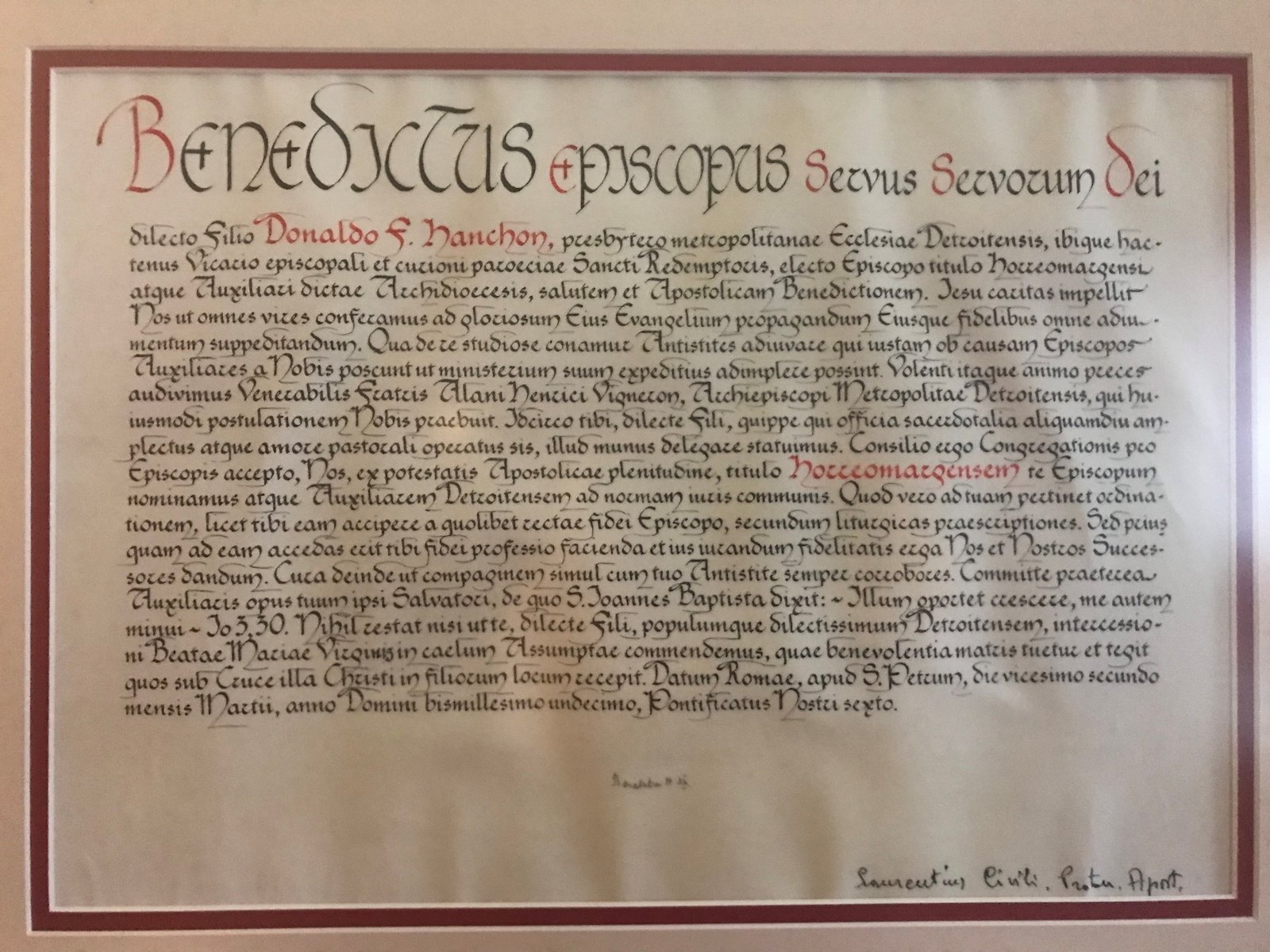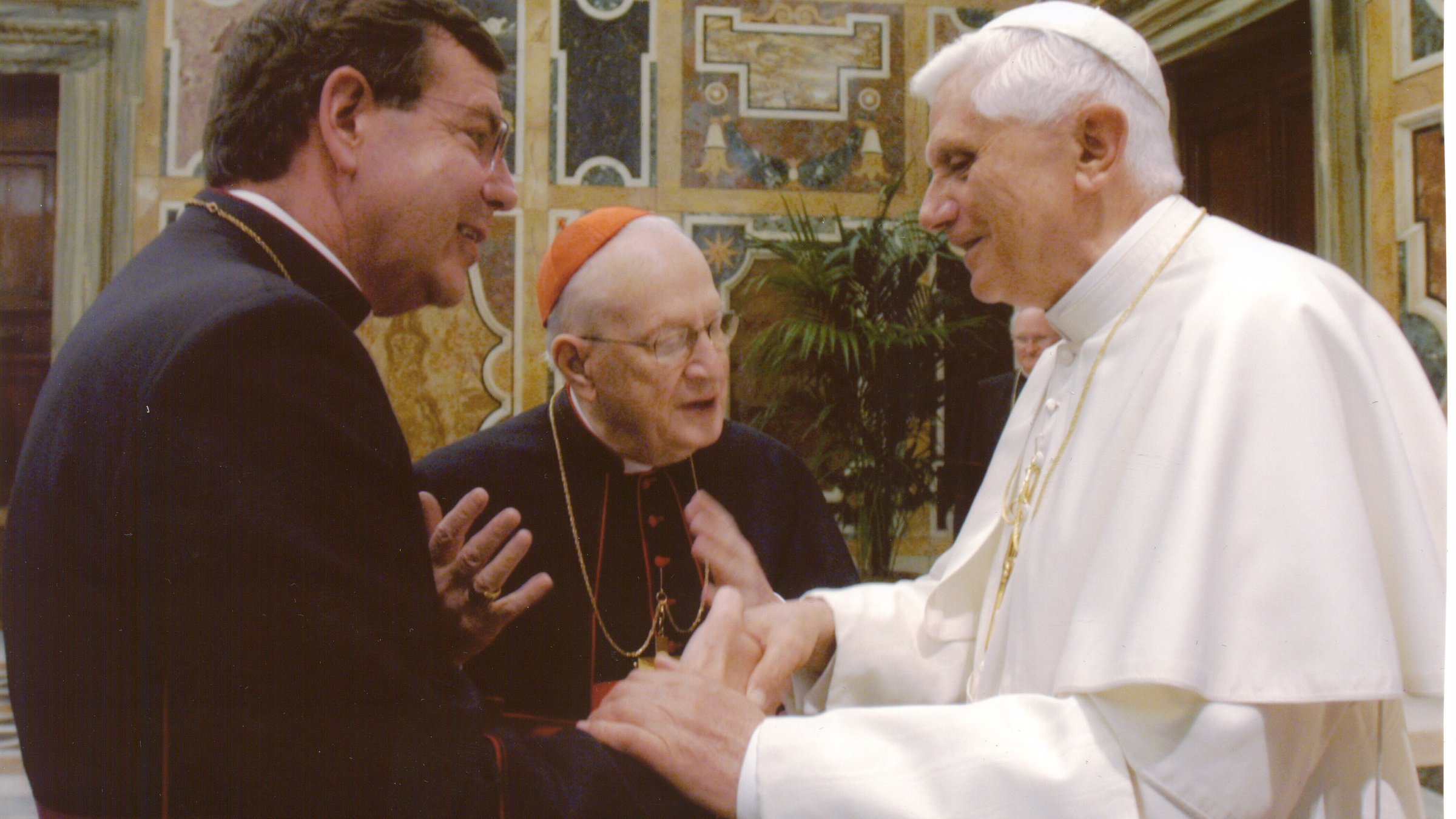Archbishop Vigneron will celebrate a Mass for the repose of pope emeritus' soul at 11 a.m. Saturday, Jan. 14, at cathedral
DETROIT — Archbishop Allen H. Vigneron and Detroit’s auxiliary bishops offered prayers and words of condolence Dec. 31 at the news from Rome of the passing of Pope Emeritus Benedict XVI.
The former pope’s death at the age of 95 comes nearly 10 years after he became the first pope in six centuries to resign, citing his health and frailty.
Pope Benedict’s eight years as pope — as well as his 71 years as a priest — were marked by crisp, profound theological insights, as well as a passion for teaching and gentleness befitting a pastor of the Church.
Archbishop Vigneron, who was appointed archbishop of Detroit by Pope Benedict in 2009, urged the Church in southeast Michigan to offer prayers for the retired pope’s soul.
"With the news today that Pope Emeritus Benedict has passed from this world to the Heavenly Father, I renew my gratitude to God for the great gift of his service to the Church,” Archbishop Vigneron said. “While his many gifts have long been evident — his penetrating intellect, his piety, his courage — what most resonates with me now is his profound humility and the gentleness with which he exercised his ministry.
"God was good to his Church in Our Holy Father Pope Benedict, and he was generous to us in his service,” Archbishop Vigneron added. “Let us return the favor by praying fervently for him, that he may be welcomed quickly into the kingdom. Eternal rest grant onto him, O Lord, and let perpetual light shine upon him. May he rest in peace."
Archbishop Vigneron will celebrate a Mass of Suffrage for the repose of Pope Benedict’s soul at 11 a.m. Saturday, Jan. 14, at the Cathedral of the Most Blessed Sacrament, the Archdiocese of Detroit said.

Cardinal Adam J. Maida, Detroit's retired archbishop, took part in the conclave that elected Pope Benedict in 2005 — a moment the cardinal previously called "one of the greatest events of my life."
Cardinal Maida, 92, who retired in 2009, came to know Pope Benedict during his pontificate as a faithful servant leader, much in the mold of his predecessor, Pope St. John Paul II.
"The Holy Father, Pope Benedict XVI, was a humble servant of God. He loved the Church and God's holy people. He was totally dedicated to live out his life in building up the Body of Christ in our world," Cardinal Maida said. "He was a gifted scholar and teacher whose spiritual insights will guide our people generations to come. I was blessed to know him, love him, and serve him in his priestly, episcopal and papal ministry. May he rest in the peace of Christ."
Detroit’s auxiliary bishops expressed similar sentiments, emphasizing Pope Benedict’s ironclad intellect and humble pastoral approach as uniquely suited for the Church in the 21st century.
“It is with sorrow tinged with joy that I mourn the death of Pope Emeritus Benedict XVI. Sorrow that we have lost such an ardent disciple and wise teacher in these tumultuous times, and joy that the object of his life, Jesus Christ, holds him forever in the palm of his hand,” Auxiliary Bishop Gerard W. Battersby said. “Pope Emeritus Benedict XVI was a humble man — to paraphrase what has been said of him — with the mind of many theologians and the heart of a first communicant.”
Auxiliary Bishop Arturo Cepeda, who was named a bishop by Pope Benedict in 2011, recalled studying in Rome as an undergraduate in the early 2000s.
“I had the privilege and blessing of being part of a series of seminars he taught at the Vatican,” Bishop Cepeda recalled. “He’s a wonderful man, and I consider him to be my professor. He was teaching spirituality and theology, and that was my area of discipline.”
Bishop Cepeda recalled the former pope as a quiet, introverted personality, but as someone who would go out of his way to help his students.

“One thing I remember very vividly from his sessions was that he was very open to questions from his students. Most of us were graduate students, mostly priests, and he would answer our questions in our native languages, whether it was English, Spanish, Italian, German — he was very fluent in all of these languages,” Bishop Cepeda said. “It was incredibly impressive.”
Bishop Battersby also studied in Rome during Pope Benedict’s pontificate, and admired the pontiff’s penchant for making complex topics approachable — both from an academic and a pastoral standpoint.
“His reputation was firmly established as one who could reduce the most sublime and complex teachings to something accessible to all,” Bishop Battersby said. “What was perhaps not as well-known was his reputation for humility and kindness to the great and the simple alike. I was struck by his gentleness and piety, which could not help but elicit the most ardent affection in me — and indeed, I believe, in all who had the privilege to know him.”
Bishop Francis Y. Kalabat of the Southfield-based Chaldean Eparchy of St. Thomas the Apostle noted that Pope Benedict's first encyclical, Deus caritas est ("God is Love"), said a great deal about the kind of pope he would be.
“It is said that the very first encyclical you write, for the pope, is the area that is most meaningful as well as something that the pope wants to concentrate on. And his first one was ‘God is Love,'" Bishop Kalabat noted. "And he really truly lived that statement. When he wrote about the life of Christ in his three-volume works ("Jesus of Nazareth"), he says ‘I am always searching for the face of Jesus.’ And he really radiated the love of God and the face of Jesus."
One of the oldest men to assume the papacy at the age of 78, Pope Benedict shocked the world with his decision to retire in 2013, but in retrospect, such a gesture of humility was in keeping with his character, Auxiliary Bishop Robert J. Fisher said.
“The Holy Spirit gives the Church the leader it needs for the time,” Bishop Fisher said. “I am most grateful for Pope Emeritus Benedict’s thoughtful intellect and great example of humility in retiring when he knew the demands of the papal role were beyond what his physical health could sustain. He was a stalwart teacher and defender of the faith. May he rest in peace!”
Auxiliary Bishop Donald F. Hanchon, who was ordained to the episcopacy in 2011 alongside Bishop Cepeda and (now Guam Archbishop) Michael J. Byrnes, also recalled the former pope as a “kind and polite person, very gentle.”
Even before his pontificate, Pope Benedict had been among the Church’s most prolific theologians and authors, Bishop Hanchon said.
“It’s just amazing what he was able to accomplish in his years as Holy Father and, before that, as the head of the Doctrine of Faith Committee for so many years under St. Pope John Paul II,” said Bishop Hanchon, who also met Pope Benedict during an ad limina visit to Rome in 2012.
Yet, for all the ink Pope Benedict put to paper, it was the smallest of notes that revealed the humility of the man, Bishop Hanchon said.

Bishop Hanchon said he always smiles when recalling the day he received the papal bull announcing his appointment as an auxiliary bishop of Detroit in 2011.
“I was amazed to discover that I have his signature in very, very small writing at the bottom of this lovely, hand-produced document of sheep skin. I laugh thinking how you can tell he was a college professor because he wrote so much, and his handwriting was so tiny,” Bishop Hanchon said. “If it were cast in type if would probably be a 5- or 6-point font versus the 12- or 14-point font of the rest of the text. It’s a very tender memory of him to look at that and to find, in the lower-right portion of the Papal Bull, that it’s simply signed, ‘Benedict pp. XVI.’”
Pope Benedict’s courage in stepping down was as significant as it was historic, Bishop Hanchon said, adding it paves the way for future popes to do the same.
“I think it was a very courageous thing to do, to decide to do this for the sake of the Church. In doing so, I think he opens a door for successors of his who may be in a similar situation,” Bishop Hanchon added. “I’ve often thought that Pope Francis would eventually do the same, because Benedict showed it was possible. I think the Church should be very grateful for his witness, for the witness of his life and ministry, and even for the witness of his passing from authority into additional service as a Pope Emeritus.”
Detroit Catholic staff reporter Gabriella Patti contributed to this report.










